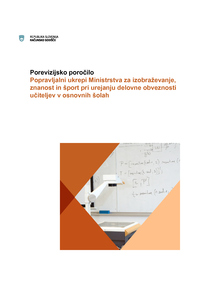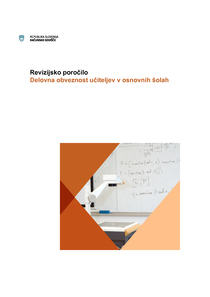The Court of Audit of the Republic of Slovenia carried out a cross-sectional audit of teacher workload in 2013. Under audit there were 4 primary schools and the Ministry of Education, Science and Sport in the period from 1 January 2012 to 31 December 2014.
The Court of Audit reviewed the efficiency of the Ministry in regulating teacher workload in primary schools. It audited the appropriateness of legal bases used for defining tasks and activities falling under teachers’ work obligation and their duration, and providing additional funds to primary schools. It also assessed the suitability and appropriateness of arrangements for organising and recording of working time and workload, as well as whether the implementation of annual working plan was examined.
According to the opinion of the Court of Audit, the Ministry was not efficient in regulating teacher workload in primary schools in the period from 1 January 2012 to 31 December 2014.
The Ministry, although responsible for regulatory framework of teacher workload in primary schools, failed to clearly define specific tasks and activities teachers are obliged to perform to receive a full-time salary. All the tasks and activities carried out by teachers at the workplace can be identified as part of their workload in accordance with Article 119 of Organization and Financing of Education Act, nevertheless, the Ministry provided additional funds to primary schools for the implementation of specific tasks and activities of teachers though it lacked suitable bases therefor since the rules and regulations do not foresee extra payments for teachers. Additionally, the Ministry did not dispose of analyses regarding the use of working hours of teachers demonstrating that certain tasks and activities could not be performed within full working time. Furthermore, duration of certain task falling under teacher workload is not clearly defined by rules. As regards teaching, duration of a teaching hour respectively a lesson within full-time is not specified (may last 45 minutes respectively 50 minutes). For other tasks and activities, including preparation for lessons, correcting and assessing pupils’ tasks and assignments, as well as other educational work whose actual scope due to its nature is neither possible nor relevant to evaluate, duration is not determined. The Court of Audit assessed that teachers with a shortened teaching time are not in an equal position as teachers with an extended teaching time as in accordance with Article 124 of Organization and Financing of Education Act; in both cases a 40-hour full working time is prescribed, though the teachers with a shortened teaching time must implement more other tasks but are paid less than the teachers with an extended teaching time who carry out less other tasks but receive a part of a salary pertaining to performance bonus for additional weekly teaching and are thus paid more. The Ministry also failed to lay down rules on organisation of working time and workload of teachers to unify the system of annual teacher workload, which is why the decision on organisation of more than half of the working time of teachers may be left to discretion of principals. In this respect, the Ministry permitted and allowed that important differences occurred in the type and quantity of certain tasks carried out by teachers in addition to teaching in order to fulfil their annual quota. Such differences exist between primary schools as well as within one primary school. The Ministry did thus not provide conditions for unified and equal treatment of teachers when defining annual workload for teachers at the level of a single or all remaining primary schools.
Furthermore, the Ministry failed to ensure that the regulations established appropriate conditions concerning uneven distribution of working time for teachers. Despite the fact that in the field of education special characteristics exist, namely during school holidays there are no lessons and the teachers have less days of annual leave compared to the number of non-teaching days, the rules do not regulate those particularities.
The nature and organisation of work at primary schools are closely linked to school calendar, therefore teachers actually work all year in conditions of uneven distribution of working time. The Court of Audit assessed that the provisions of Employment Relationship Act concerning organisation of working time are not appropriate for time management of teachers, particularly provision that full working time shall be considered as an average working obligation during a period that may not exceed six months. Since teachers carry out their work also at home, i.e. mainly tasks duration of which cannot be or is not appropriate to be estimated (preparations for lessons, assessing pupils’ tasks and assignments), school management is faced with the problem of defining, considering and recording the scope of implemented work at home. The Ministry thus failed to clearly define by regulations the duration of tasks that fall within teacher workload.
As the Ministry did not provide for the regulations to clearly define individual tasks falling within teacher workload and the scope respectively the manner of evaluating those tasks, there were no adequate legal bases for appropriate recording of working time and workload of teachers. Primary schools keep different records, nevertheless it is not possible to determine on their basis whether teachers carried out their full-time working obligation. The Ministry does not have its representative in school councils, therefore it neither participated in the procedures of adopting their annual work plans, nor received information about their implementation. The Inspectorate for Education and Sport of the Republic of Slovenia as subordinate body of the Ministry did not review the implementation of the annual work plans or curriculums when carrying out its controls. The Court of Audit believes that such reviews should be an integral part of regular controls carried out by the Inspectorate as determined by its annual programme developed in the agreement with the Ministry.
The Court of Audit demanded from the Ministry to submit a response report indicating corrective measures to remedy disclosed inefficiencies and proposed recommendations to define working obligation of teachers in a more efficient way.



